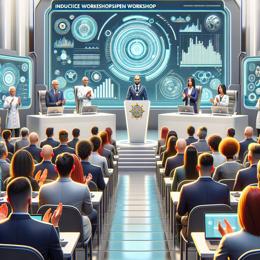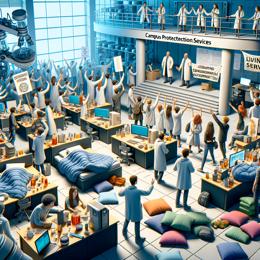Image created by AI
University of Pretoria Strike Exposes Deeper National Crises
The University of Pretoria this week served as the latest stage for South Africa's complex socio-economic theater, where a workers' strike brought stark attention to the nation's broader challenges. The National Education, Health and Allied Workers’ Union (Nehawu) members staged a protest which inadvertently barred students from entering the campus, offering a glimpse into the paradox of South African aspiration and reality.
Students, ignited with the fresh enthusiasm that comes with the start of a new academic journey, found themselves confronting an all too familiar scene. The clash between the workers’ right to strike and the students’ right to education became palpable at the gates of the Hatfield campus, which remained firmly shut amid the protest. What should have been a buzzing hub of learning and development was transformed into a ground zero of frustration and missed opportunities.
The strike by Nehawu workers called for a 7% wage increase, which seems a modest demand against the backdrop of the country’s 5.3% inflation rate. However, the financial turmoil that encumbers South Africa’s educational institutions cannot be overlooked. The university, facing a reduced government subsidy and responsible for a R650-million student debt, staggers under the weight of economic constraints, compounded by the relentless pressure of load shedding requiring exorbitant spending on generators.
The resulting stand-off has seen campus operations pivot to online platforms, a move that exacerbates inequalities as disadvantaged students struggle for internet access and the ability to continue their studies remotely. This microcosm at the University of Pretoria serves as a reflection of the nation's macro-economic malaise. It's a remarkable encapsulation of the government's austerity measures meeting the gritty reality of lives and livelihoods reliant on the public sector.
The resolution of this dispute will necessitate the kind of fiscal prudence and compassion that South Africans are yearning for at every level of governance. The urgency for a functional National Health Insurance and the cessation of seemingly ceaseless bailouts for failing state-owned enterprises looms over the horizon.
Recognizing the depth of the larger socio-economic predicament South Africa faces, citizens anticipate the next election poised to shape the nation’s trajectory. Amidst the disciplines of tightened budgets and intensified efforts to build a more equitable society, the University of Pretoria incident signals a broader call to action. South Africans are ready to cast their ballots for change that will forge a future where education and economic viability are not at odds.










